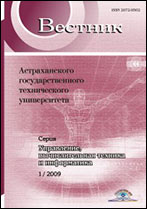|
COMPUTER SOFTWARE AND COMPUTING EQUIPMENT
Method of spam detection based on artificial immune systems
M. P. Malykhina, V. A. Chastikova, A. A. Biktimirov
Kuban State Technological
University
Abstract:
The task of developing tools to combat spam is currently focused on creating such
techniques for detecting spam, which are endowed with the skills and qualities inherent in a person
whose work is not limited to patterns and therefore highly effective. Man has the ability to detect
spam signs, which is based on his own knowledge, experience and preferences. There has been
substantiated the need to develop a new approach to solving the problem of detecting spam messages, which is based on heuristic methods of optimization, is effective at the initial stage of training
and has a low frequency of false operations. This formulation of the problem fully corresponds
to modeling mechanisms of the immune systems of living organisms that ensure their survival, these
mechanisms being represented, investigated and used by software. There have been identified
and described main mechanisms of artificial immune systems intended for solving the problem
of spam detection, as well as software and system interacting. The basic concepts of constructing
an artificial immune system for the purpose formulated above are determined: class of detectors,
presentation of receptors and pathogens. A model of the relationships between them has been
worked out. A technique for detecting spam based on the work of an artificial immune system is
proposed, an algorithm for its implementation is developed, and the specifics of its members to
identify spam messages are described. A software package with advanced research capabilities has
been created. Testing and analysis of the results to determine the optimum values of the system operation
parameters have been conducted.
Keywords:
antispam, affinity, detector, artificial immune system, spam.
Received: 22.03.2018
Citation:
M. P. Malykhina, V. A. Chastikova, A. A. Biktimirov, “Method of spam detection based on artificial immune systems”, Vestn. Astrakhan State Technical Univ. Ser. Management, Computer Sciences and Informatics, 2018, no. 3, 38–48
Linking options:
https://www.mathnet.ru/eng/vagtu540 https://www.mathnet.ru/eng/vagtu/y2018/i3/p38
|

| Statistics & downloads: |
| Abstract page: | 168 | | Full-text PDF : | 47 | | References: | 6 |
|




 Contact us:
Contact us: Terms of Use
Terms of Use
 Registration to the website
Registration to the website Logotypes
Logotypes








 Citation in format
Citation in format 